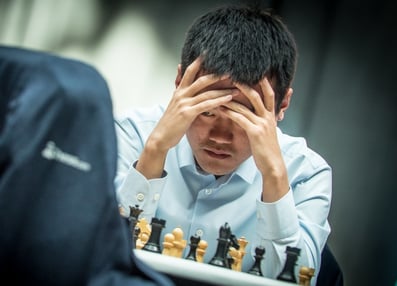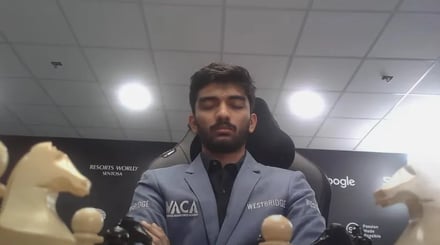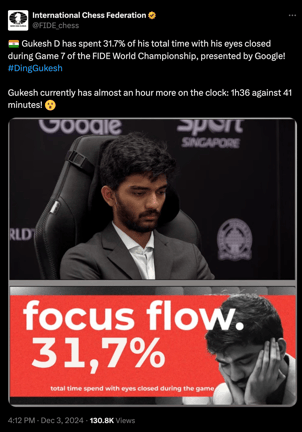When Silence Speaks: The Inner Battle of the 2024 World Chess Championship
A look at how the mental fitness battles of Ding Liren and Gukesh D defined the tension-ridden 2024 World Chess Championship. Here, composure and calm proved just as decisive as tactics and strategy, setting the stage for a finish that’s anyone’s guess.
12/12/20244 min read
The 2024 World Chess Championship between Ding Liren and Gukesh D is at an exciting stage with the scores tied at 6.5-6.5 after 13 games of intense classical chess with 1 game (and tie-breaks) remaining to crown the new World Chess Champion. It isn’t just an epic duel of pieces on the board, it’s also a window into the human psyche. The tension has become a riveting spectacle. However, as moves and countermoves unfold, one of the most remarkable plotlines is the players' mental fitness techniques and how they mirror techniques we can all learn to maintain composure under duress, rather than the complexities of chess theory.
While Ding Liren is at the board, keep a close eye on him. He twitches. His stance changes. There is a noticeable tightness in his eyes as they dart. It’s almost jarring to watch someone so brilliant at chess seem so uneasy under the spotlight. You may assume he's about to fall apart if you didn't know him.


However, the nervous energy vanishes as soon as he leaves the stage for a little rest. Ding is suddenly quiet, collected, and almost at ease. The way he sits on the chair in the break room during the match has been turned into numerous memes. It has also earned him a nickname quite contrary to his playing persona - ‘Chill Ding’.


It's no news that the current champion has publicly discussed his anxiety issues, acknowledging that even elite athletes struggle with inner anguish. Instead of repressing the anxiety, Ding accepts it and then employs short walks, introspection, or eating bananas in the break room to regain his equilibrium. In a sense, Ding's story serves as a reminder that it's perfectly normal to feel frazzled while dealing with significant obstacles in life, at business, or in sports. The ability to return to your center after acknowledging the internal tempest is the real expertise. The way Ding played an almost flawless game (almost 99% accuracy at one point) in Game 12 after a crushing defeat in Game 11, tells a lot of the mental fortitude he possesses.
Then there is Gukesh D, the 18-year-old challenger who seems to play and behave at a level way above his age. With an almost unearthly approach to mental fitness, Gukesh has a legendary level of composure; it seems as though he has drawn from an inner reservoir of peace. Ding struggles with stress on the outside, but Gukesh integrates yoga, mindfulness, and a strict exercise routine into his daily routine. Drawing inspiration from tennis great Novak Djokovic, he applies the concepts of mental training to the chess game.


The impact is profound: Gukesh closed his eyes for long periods of time to coordinate his breathing and clear his mind before delivering an almost faultless performance in Game 11. This isn't merely a story; according to FIDE's inconspicuous data collecting, in Game 7, Gukesh had been essentially meditating at the board by spending about 31% of his match time with his eyes closed. It appears to fortify him against the immense strain, transforming a high-stakes setting into one in which he can maintain composure and composure.


In addition to being an intriguing chess footnote, this collection of statistics and anecdotes offers insightful lessons about mental fitness. The significance of basic coping strategies is highlighted by Ding's candor regarding worry and his proactive resetting techniques. Long before the time of truth comes, mental readiness can be ingrained in your routine, as seen by Gukesh's regular practice of closing his eyes to "reset" his brain. He demonstrates that even in the most hectic situations, there can be a moment of mindfulness with his eyes-closed practice, which is similar to a virtual meditation session.
These players' tactics are similar to those that psychologists and wellness specialists have long advised for daily stress management if we look beyond the chessboard and take a more comprehensive view. Ding symbolizes the fact that stress might occasionally catch up with us and that it's important to have strategies in place to help us re-align ourselves after it does. Gukesh is the epitome of preventative mental health care; he practices regularly so that his calmness is available when the pressure builds, and he doesn't have to rush to get it. Both strategies are instruments we may use on a daily basis to expand our toolkit. Channelling Ding and taking a quick break will help you restore your composure when you're feeling overwhelmed at work. When you know big challenges are on the horizon, you can cultivate regular mindfulness habits like Gukesh, so that resilience becomes second nature.
Their divergent approaches further demonstrates how personalized mental health is. To maintain a baseline of calm, some people may prefer daily mental "training sessions," while others may find comfort in admitting their concerns and then gently pushing through them. It might be both of them combined. The most important thing is that mental fitness is a skill that everyone can learn, hone, and master—it is not a secret talent only top athletes possess.
Both players have demonstrated to us that mental toughness and emotional control are just as significant as the most astute gambits or the most astute calculations, and they both stand on the brink as the last match and tiebreaks approach. The real legacy of this World Championship will be determined by the composure and presence each competitor brought to the table, not just by the plays they executed, whether it was Ding's quiet tenacity or Gukesh's peaceful meditations that ultimately turned the tide. The winner and, in many respects, the lasting lessons we will learn from this remarkable contest of the intellectuals are still up in the air.
P.S. In case you want to catch the action of game 14, check out these links -
FIDE Official - https://www.youtube.com/watch?v=6WP1X_gOYAw&ab_channel=FIDEchess
Chessbase India- https://www.youtube.com/watch?v=5-uuDuGQLQA&ab_channel=ChessBaseIndia
Chess24 - www.youtube.com/@Chess24
Build lasting mental fitness with guided practices and personalized coaching from Gritus, your personal AI coach
Reach us at
Subscribe for updates
© 2024. All rights reserved.


